Relatively few Americans view the morality of abortion in stark terms: Overall, just 7% of all U.S. adults say abortion is morally acceptable in all cases, and 13% say it is morally wrong in all cases. A third say that abortion is morally wrong in most cases, while about a quarter (24%) say it is morally acceptable most of the time. About an additional one-in-five do not consider abortion a moral issue.
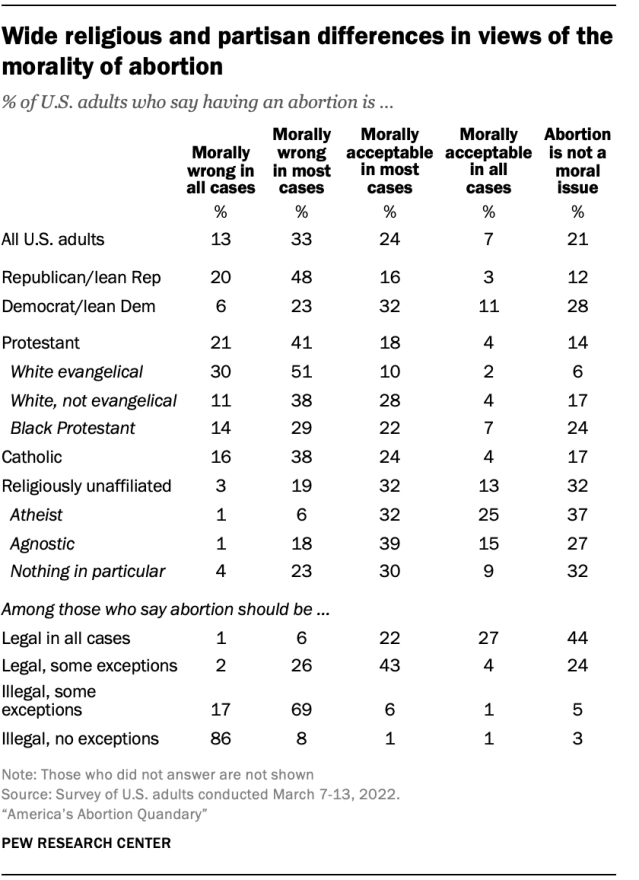
There are wide differences on this question by political party and religious affiliation. Among Republicans and independents who lean toward the Republican Party, most say that abortion is morally wrong either in most (48%) or all cases (20%). Among Democrats and Democratic leaners, meanwhile, only about three-in-ten (29%) hold a similar view. About four-in-ten Democrats say abortion is morally acceptable in most (32%) or all (11%) cases, while an additional 28% say abortion is not a moral issue.
White evangelical Protestants overwhelmingly say abortion is morally wrong in most (51%) or all cases (30%). A slim majority of Catholics (53%) also view abortion as morally wrong, but many also say it is morally acceptable in most (24%) or all cases (4%), or that it is not a moral issue (17%). And among religiously unaffiliated Americans, about three-quarters see abortion as morally acceptable (45%) or not a moral issue (32%).
There is strong alignment between people’s views of whether abortion is morally wrong and whether it should be illegal. For example, among U.S. adults who take the view that abortion should be illegal in all cases without exception, fully 86% also say abortion is always morally wrong. The prevailing view among adults who say abortion should be legal in all circumstances is that abortion is not a moral issue (44%), though notable shares of this group also say it is morally acceptable in all (27%) or most (22%) cases.
Most Americans who say abortion should be illegal with some exceptions take the view that abortion is morally wrong in most cases (69%). Those who say abortion should be legal with some exceptions are somewhat more conflicted, with 43% deeming abortion morally acceptable in most cases and 26% saying it is morally wrong in most cases; an additional 24% say it is not a moral issue.
The survey also asked respondents who said abortion is morally wrong in at least some cases whether there are situations where abortion should still be legal despite being morally wrong. Roughly half of U.S. adults (48%) say that there are, in fact, situations where abortion is morally wrong but should still be legal, while just 22% say that whenever abortion is morally wrong, it should also be illegal. An additional 28% either said abortion is morally acceptable in all cases or not a moral issue, and thus did not receive the follow-up question.
Across both political parties and all major Christian subgroups – including Republicans and White evangelicals – there are substantially more people who say that there are situations where abortion should still be legal despite being morally wrong than there are who say that abortion should always be illegal when it is morally wrong.
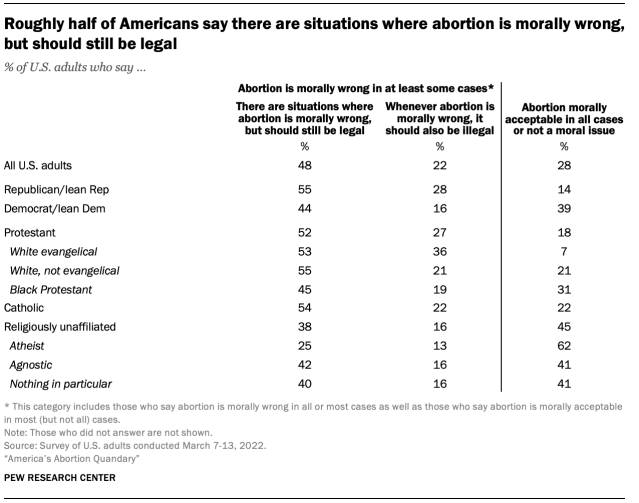
Public views of what would change the number of abortions in the U.S.
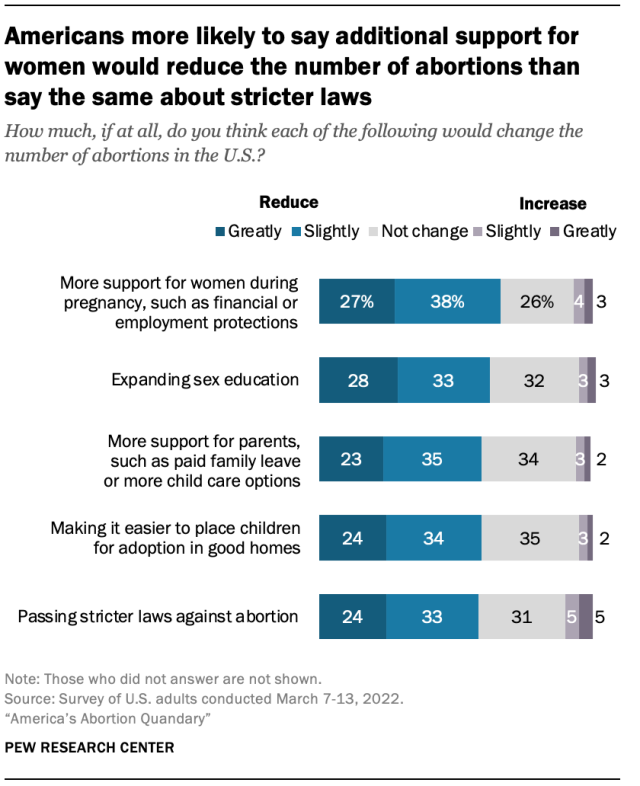
Asked about the impact a number of policy changes would have on the number of abortions in the U.S., nearly two-thirds of Americans (65%) say “more support for women during pregnancy, such as financial assistance or employment protections” would reduce the number of abortions in the U.S. Six-in-ten say the same about expanding sex education and similar shares say more support for parents (58%), making it easier to place children for adoption in good homes (57%) and passing stricter abortion laws (57%) would have this effect.
While about three-quarters of White evangelical Protestants (74%) say passing stricter abortion laws would reduce the number of abortions in the U.S., about half of religiously unaffiliated Americans (48%) hold this view. Similarly, Republicans are more likely than Democrats to say this (67% vs. 49%, respectively). By contrast, while about seven-in-ten unaffiliated adults (69%) say expanding sex education would reduce the number of abortions in the U.S., only about half of White evangelicals (48%) say this. Democrats also are substantially more likely than Republicans to hold this view (70% vs. 50%).
Democrats are somewhat more likely than Republicans to say support for parents – such as paid family leave or more child care options – would reduce the number of abortions in the country (64% vs. 53%, respectively), while Republicans are more likely than Democrats to say making adoption into good homes easier would reduce abortions (64% vs. 52%).
Majorities across both parties and other subgroups analyzed in this report say that more support for women during pregnancy would reduce the number of abortions in America.
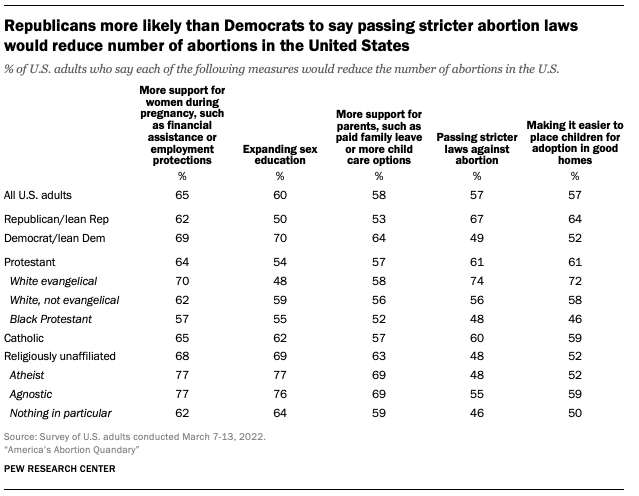
A majority of Americans say women should have more say in setting abortion policy in the U.S.
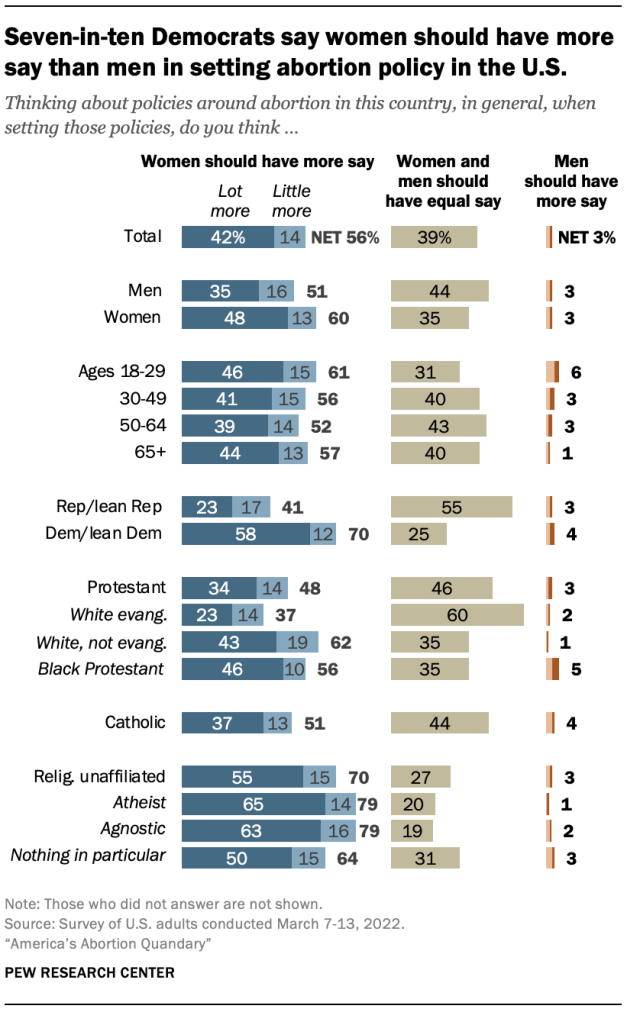
More than half of U.S. adults (56%) say women should have more say than men when it comes to setting policies around abortion in this country – including 42% who say women should have “a lot” more say. About four-in-ten (39%) say men and women should have equal say in abortion policies, and 3% say men should have more say than women.
Six-in-ten women and about half of men (51%) say that women should have more say on this policy issue.
Democrats are much more likely than Republicans to say women should have more say than men in setting abortion policy (70% vs. 41%). Similar shares of Protestants (48%) and Catholics (51%) say women should have more say than men on this issue, while the share of religiously unaffiliated Americans who say this is much higher (70%).
How do certain arguments about abortion resonate with Americans?
Seeking to gauge Americans’ reactions to several common arguments related to abortion, the survey presented respondents with six statements and asked them to rate how well each statement reflects their views on a five-point scale ranging from “extremely well” to “not at all well.”
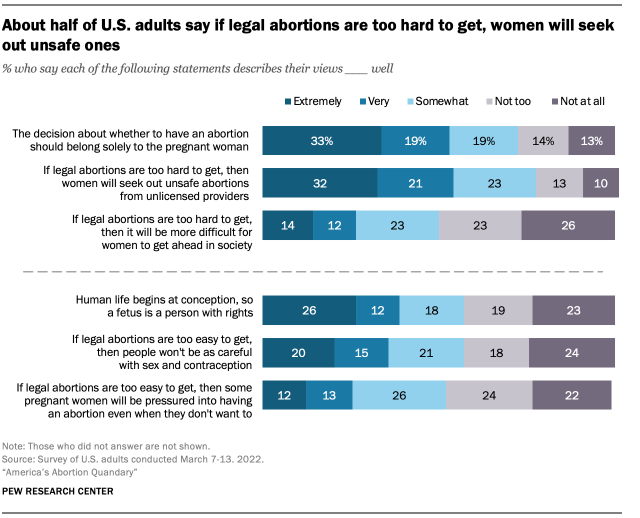
The list included three statements sometimes cited by individuals wishing to protect a right to abortion: “The decision about whether to have an abortion should belong solely to the pregnant woman,” “If legal abortions are too hard to get, then women will seek out unsafe abortions from unlicensed providers,” and “If legal abortions are too hard to get, then it will be more difficult for women to get ahead in society.” The first two of these resonate with the greatest number of Americans, with about half (53%) saying each describes their views “extremely” or “very” well. In other words, among the statements presented in the survey, U.S. adults are most likely to say that women alone should decide whether to have an abortion, and that making abortion illegal will lead women into unsafe situations.
The three other statements are similar to arguments sometimes made by those who wish to restrict access to abortions: “Human life begins at conception, so a fetus is a person with rights,” “If legal abortions are too easy to get, then people won’t be as careful with sex and contraception,” and “If legal abortions are too easy to get, then some pregnant women will be pressured into having an abortion even when they don’t want to.”
Fewer than half of Americans say each of these statements describes their views extremely or very well. Nearly four-in-ten endorse the notion that “human life begins at conception, so a fetus is a person with rights” (26% say this describes their views extremely well, 12% very well), while about a third say that “if legal abortions are too easy to get, then people won’t be as careful with sex and contraception” (20% extremely well, 15% very well).
When it comes to statements cited by proponents of abortion rights, Democrats are much more likely than Republicans to identify with all three of these statements, as are religiously unaffiliated Americans compared with Catholics and Protestants. Women also are more likely than men to express these views – and especially more likely to say that decisions about abortion should fall solely to pregnant women and that restrictions on abortion will put women in unsafe situations. Younger adults under 30 are particularly likely to express the view that if legal abortions are too hard to get, then it will be difficult for women to get ahead in society.
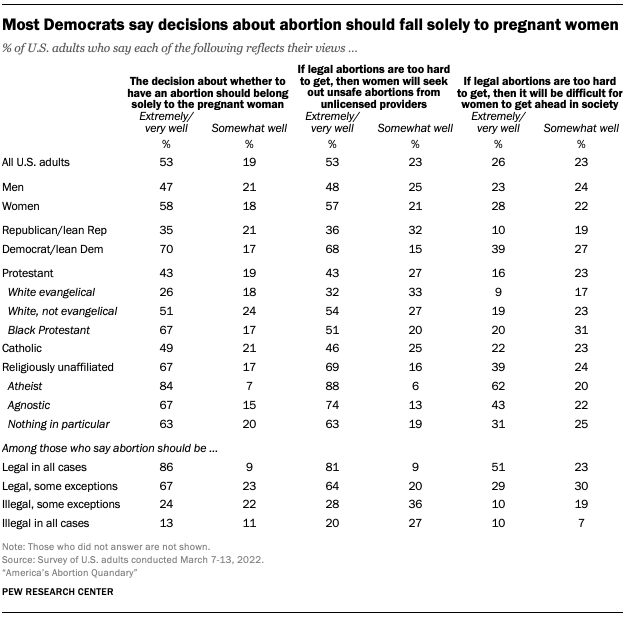
In the case of the three statements sometimes cited by opponents of abortion, the patterns generally go in the opposite direction. Republicans are more likely than Democrats to say each statement reflects their views “extremely” or “very” well, as are Protestants (especially White evangelical Protestants) and Catholics compared with the religiously unaffiliated. In addition, older Americans are more likely than young adults to say that human life begins at conception and that easy access to abortion encourages unsafe sex.
Gender differences on these questions, however, are muted. In fact, women are just as likely as men to say that human life begins at conception, so a fetus is a person with rights (39% and 38%, respectively).
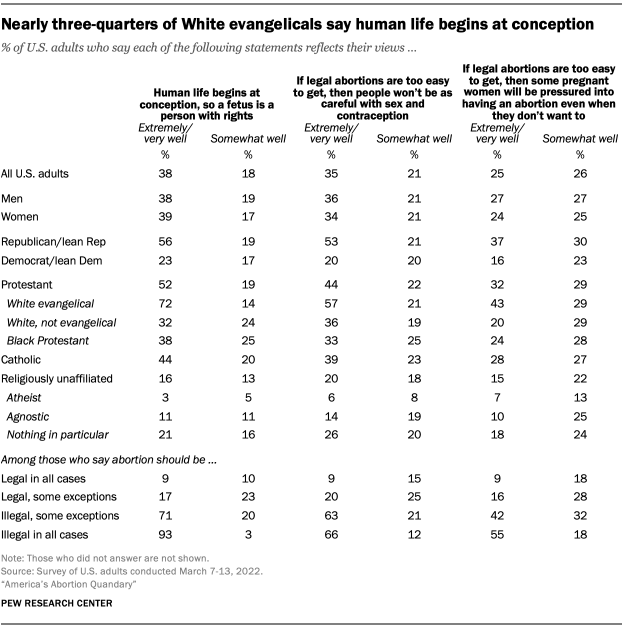
Analyzing certain statements together allows for an examination of the extent to which individuals can simultaneously hold two views that may seem to some as in conflict. For instance, overall, one-in-three U.S. adults say that both the statement “the decision about whether to have an abortion should belong solely to the pregnant woman” and the statement “human life begins at conception, so the fetus is a person with rights” reflect their own views at least somewhat well. This includes 12% of adults who say both statements reflect their views “extremely” or “very” well.
Republicans are slightly more likely than Democrats to say both statements reflect their own views at least somewhat well (36% vs. 30%), although Republicans are much more likely to say only the statement about the fetus being a person with rights reflects their views at least somewhat well (39% vs. 9%) and Democrats are much more likely to say only the statement about the decision to have an abortion belonging solely to the pregnant woman reflects their views at least somewhat well (55% vs. 19%).
Additionally, those who take the stance that abortion should be legal in all cases with no exceptions are overwhelmingly likely (76%) to say only the statement about the decision belonging solely to the pregnant woman reflects their views extremely, very or somewhat well, while a nearly identical share (73%) of those who say abortion should be illegal in all cases with no exceptions say only the statement about human life beginning at conception reflects their views at least somewhat well.

In their own words: How Americans feel about abortion
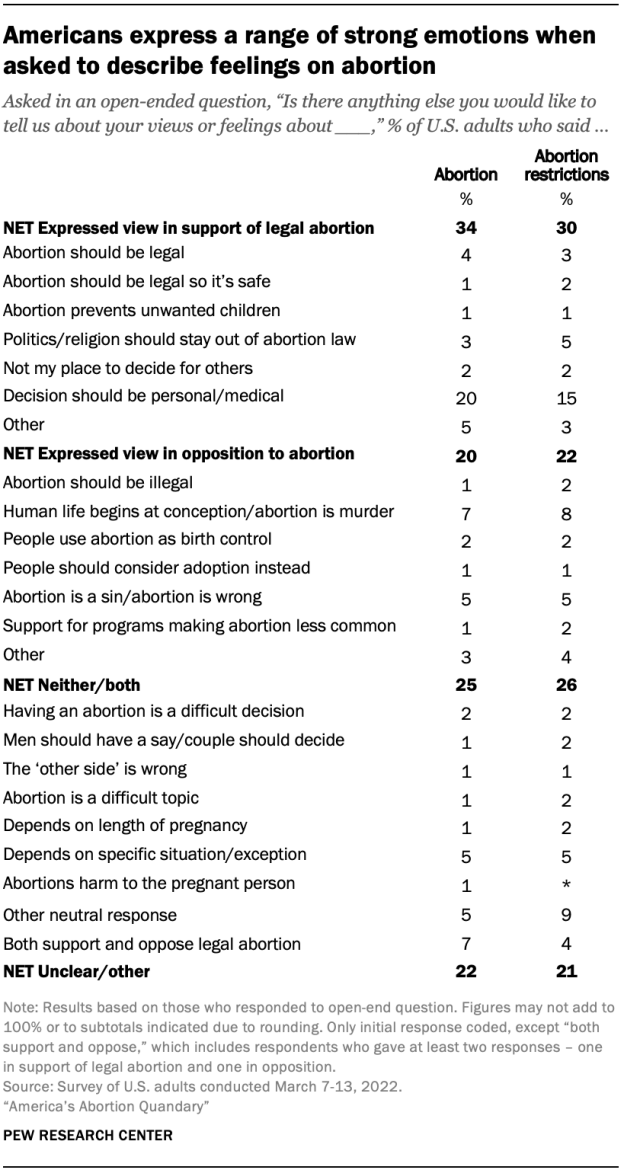
When asked to describe whether they had any other additional views or feelings about abortion, adults shared a range of strong or complex views about the topic. In many cases, Americans reiterated their strong support – or opposition to – abortion in the U.S. Others reflected on how difficult or nuanced the issue was, offering emotional responses or personal experiences to one of two open-ended questions asked on the survey.
One open-ended question asked respondents if they wanted to share any other views or feelings about abortion overall. The other open-ended question asked respondents about their feelings or views regarding abortion restrictions. The responses to both questions were similar.
Overall, about three-in-ten adults offered a response to either of the open-ended questions. There was little difference in the likelihood to respond by party, religion or gender, though people who say they have given a “lot” of thought to the issue were more likely to respond than people who have not.
Of those who did offer additional comments, about a third of respondents said something in support of legal abortion. By far the most common sentiment expressed was that the decision to have an abortion should be solely a personal decision, or a decision made jointly with a woman and her health care provider, with some saying simply that it “should be between a woman and her doctor.” Others made a more general point, such as one woman who said, “A woman’s body and health should not be subject to legislation.”
About one-in-five of the people who responded to the question expressed disapproval of abortion – the most common reason being a belief that a fetus is a person or that abortion is murder. As one woman said, “It is my belief that life begins at conception and as much as is humanly possible, we as a society need to support, protect and defend each one of those little lives.” Others in this group pointed to the fact that they felt abortion was too often used as a form of birth control. For example, one man said, “Abortions are too easy to obtain these days. It seems more women are using it as a way of birth control.”
About a quarter of respondents who opted to answer one of the open-ended questions said that their views about abortion were complex; many described having mixed feelings about the issue or otherwise expressed sympathy for both sides of the issue. One woman said, “I am personally opposed to abortion in most cases, but I think it would be detrimental to society to make it illegal. I was alive before the pill and before legal abortions. Many women died.” And one man said, “While I might feel abortion may be wrong in some cases, it is never my place as a man to tell a woman what to do with her body.”
The remaining responses were either not related to the topic or were difficult to interpret.


